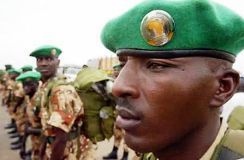Sudan rejects Africa troop offer at Darfur talks
By Dino Mahtani
ABUJA, Aug 23 (Reuters) – Sudan rejected an offer of African troops to disarm rebels in Darfur as peace talks began in Nigeria, insisting it was capable of neutralising both pro-government and rebel militia fighting in the western region.
 Rebels, in turn, said they would not accept disarmament by Sudanese government forces to end an 18-month-old conflict.
Rebels, in turn, said they would not accept disarmament by Sudanese government forces to end an 18-month-old conflict.
Nigeria’s President Olusegun Obasanjo made the proposal ahead of the talks in Abuja, arguing that Sudanese forces were incapable of disarming the rebels without more fighting in Darfur where conflict has already killed up to 50,000 people.
But Sudan’s top government negotiator Mazjoub al-Khalifa dismissed African Union chairman Obasanjo’s deal in which AU troops would disarm rebels while leaving the disarmament of the pro-government Janjaweed militia to Khartoum.
“I don’t think there is a need for this,” said Khalifa, Sudan’s agriculture minister, before talks with negotiators from two Darfur rebel groups. “Simultaneously we will disarm the rebel movements, the Janjaweed and other militia.”
That idea was swiftly rejected by an official from one of the rebel groups. “There is no way we can let our enemies disarm us. They are still killing us and bombing us,” said Abubakar Hamid Nour, coordinator of the Justice and Equality Movement.
The Darfur revolt broke out in February 2003 after years of conflict between Arab nomads and African farmers over scarce resources in Sudan’s arid western region.
Rebels say Khartoum has armed Arab Janjaweed militia to loot and burn villages in a campaign of ethnic cleansing. Khartoum denies the charge and calls the Janjaweed outlaws.
But the government has intensified efforts to prove it is cracking down on the militia ahead of an August 30 U.N. Security Council deadline to show progress towards protecting civilians and disarming the Janjaweed or face possible sanctions.
KILLING GOES ON
U.N. envoy Jan Pronk, who will report on progress to Secretary-General Kofi Annan, said on Monday killing was still going on in Darfur but the government was making efforts to improve security.
“There is no mass killing going on in this country,” he told BBC radio from Sudan. “There is killing, but there is no reason to believe…that the government is behind those killings.”
The fighting has driven more than a million people from their homes, mostly into camps dotted across Darfur and neighbouring Chad. The United Nations says the conflict has triggered the world’s worst humanitarian crisis.
Stepping up the international pressure that has persuaded the government and rebels to the negotiating table, British Foreign Secretary Jack Straw flew to Sudan on Monday.
“I will impress on the government of Sudan the scale of international concern about the humanitarian crisis in Darfur and the atrocities committed there,” Straw told reporters as he prepared to leave for Khartoum.
“I will (also) impress on them the need to make full progress in implementing the obligations they have accepted under the U.N. Security Council resolution.”
Rwanda has already sent 155 troops to protect AU officials monitoring a ceasefire between the rebels and the government, and Nigeria is due to send another 150 this week.
But Nigeria is already thinking of sending up to 1,500 troops and other African nations have offered to join them.
BREAKING THE DEADLOCK
A previous Darfur peace initiative broke down in July after the rebels demanded as a precondition for talks that the government disarm the Janjaweed.
Obasanjo said the AU troops could be key to break this deadlock but tried to allay Sudanese government concerns of foreign meddling.
“Any AU troops are meant to complement and support the defence and security agencies of Sudan,” said Obasanjo before the start of closed door talks. “The AU force is not a peacekeeping force in the classical meaning of the expression.”
The Nigeria talks were also attended by delegates from the second Darfur rebel group, the Sudan Liberation Army (SLA), and by Arab League Secretary-General Amr Moussa.
They came come two days after Khartoum signed an agreement with the United Nations to ensure the voluntary return of refugees and to give Darfuris more say in local government.
